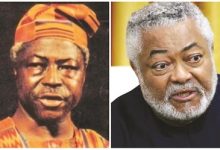As per Article 67 of the 1992 Constitution of the republic, the President of the Republic is expected “at the beginning of each session of Parliament and before a dissolution of Parliament, deliver to Parliament a message on the state of the nation,”
This has, over the years, been a major political as well as constitutional activity honored religiously by all Presidents of the fourth republic. This is popularly referred to as SONA
The President, Nana Addo Dankwa Akufo-Addo was scheduled to deliver the last SONA of his first term as president last week. Just after entering the chamber and exchanged pleasantries with some members of the House and dignitaries present, the National Anthem as usual was played by the National Police Band.
He was then ready to read his address to spell out the state of the nation by way of economy, security, health, education among others.
Just before the President was to be introduced to deliver his speech, the Minority Leader Haruna Iddrisu, who had been part of the Parliamentary retinue to officially welcome him to the House, led his members to stage a walkout.
The Minority Members of Parliament (MPs) walked out of the chamber, amidst chanting of songs and waving of placards. They then left behind them placards with various inscriptions.
Present were highly placed individuals such as some former Presidents of the land, The Vice President, The Chief Justice, Members of the Diplomatic Corps. Service Commanders, The Clergy, Traditional and other Opinion Leaders among many others.
The heavy attendance by such distinguished individuals obviously depicted the seriousness as well as the high importance of the event to the good people of Ghana and also explained why it is enshrined in the constitution of this country.
I stated last week that the Ghanaian State of the Nation Address is similar to the Union Address of the United State of America which is also held annually in the chamber of the USA House of Representatives to the Congress. very renowned and important.
Apart from being a constitutional requirement, the State of the Nation Address enables the country to take stock of what had happened in the past and plan the way forward.
It also enables the people to do a general assessment of the governance of the country in terms of economy, security, agriculture, industry, education, health and other relevant sectors of the economy.
This year’s walkout was perhaps the worse in the history of Ghana’s parliamentary history as Members of Parliament elected to represent the people blatantly disregarding a constitutional activity and rather stuck to party interest and not that of the people they represent.
History has it that over twenty boycotts and walkout have taken place between 1992 and now by minority parties in parliament. It cannot happen but let me say that no Majority party has boycotted nor walkout from parliament ever.
All boycotts have been done by the Minority parties, buttressing the point that “The Minority will always have their say and the Minority will have their way”. In all boycotts no compromise has been reached. The Majority have always gone ahead to do what pleases them while the Minority on the other hand cried foul.
Wanting to make good cases out of the definite wrong doing, they resort to the use of semantics. At times, they say it was a walkout sometimes, the same action becomes boycott. The Collins English Dictionary fortunately have definitions for the two words.
While boycott is defined as “withdraw from commercial or social relations with (a country, organization, or person) as a punishment or protest”, the meaning of walkout is “a sudden angry departure, especially as a protest or strike”. What is the difference?
One can make cogent reasoning out of the above. Politicians and Ghanaian politicians will always have the means, right or wrong, to convince the constituents to carry out what gratifies them.
These two sides of the parliamentary divide have one time or the other boycotted legitimate and constitutional process. The National Democratic Congress (NDC) being the worse under the circumstance, boycotting sixteen sittings of parliament with the New Patriotic Party (NPP) engaging in six
Causes of their boycotts vary widely and included unnecessary entrenchment in positions, inability of members to reach consensus on simple matters, lack of trust in each other, ineffective communications between the two parties in parliament among others.
Our Members of Parliament have disagreed on almost everything political under the sun apart from their interests, resulting in the numerous and unwarranted boycotts. We have not heard them disagreeing, walking out nor boycotting any session on salaries, per-diem, allowances, travels, and anything “that is of their heart desire”
The effects of the boycotts have always been negative. Sadly, political interest has overridden the interest of the constituents. The effects from parliamentary boycotts have negatively contributed to wrong perceptions of the work of parliaments. It is perceived that they are there for their selfish interest.
It normally creates unnecessary political tension in the country. From all boycotts by our MPs, the boycotters come back to parliament in an uneasy manner. In some cases, they feel victors but the majority claim superiority, for their wishes have carried the day. In all these, I stress here again that the voter is the loser.
In all, twenty-two boycotts by MPs of the Parliament of Ghana have occurred since the inception of the fourth republic, all of them by the Minority of the era. This happens when the tables turn. The NDC started it all even though they were not the first Minority party. They have walked out on sixteen times as stated earlier. Their first boycott was in August 2003. This was about the debate on the National Health Insurance Scheme (NHIS), Bill. The NDC MPs accused the then government of deceiving Ghanaians on the subject.
Seven years later the New Patriotic Party (NPP) minority in then parliament staged their first boycott in August 2010. This was on the STX Korean housing deal. For them the NDC Majority had betrayed a trust they had in them after an initial agreement.
The year 2018 saw the highest number of boycotts by the Minority NDC. These were in May, June, August and November. In February 2019 alone, the NDC MPs, boycotted proceedings on three occasions, all of which were about election and swearing-in of the Ayawaso West Wuogon MP, Lydia Alhassan. This is when they were seen in the chamber cladded in black, displaying placards with the inscription “Bloody Widow”
In all these, the Minority had operated from the outside the chamber, the legitimate and designated venue for Parliamentary business. Virtually it becomes another ‘parliament’ outside the real parliament. They struggle for the media to disseminate their message to the constituents to win their sympathy.
Our Honorables must understand that, parliament in modern politics and history is “a legislative body of government. Generally, a modern parliament has three main functions. Paramount among these is to represent the electorate and not party. Without the electorate there would be no MP. Our MPs must be guided by fact that their constituents consist of members of their respective parties and others.
They also make laws, and oversee the government via hearings and inquiries. These are all done in the chamber of Parliament and not outside of it. There is only one parliament and there must not be any parliament outside parliament
Nana Sifa Twum


